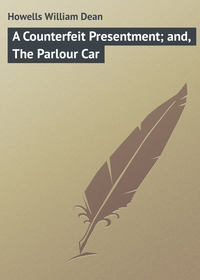 полная версия
полная версияThe Quality of Mercy
He put this tentatively, and his son responded, "I suppose that naturally inclines you to suppose he'll run away."
"Yes."
"But your supposition doesn't establish the fact."
"No. But the question is whether it doesn't oblige me to act as if it had; whether I oughtn't, if I've got this suspicion, to take some steps at once to find out whether Northwick's really gone or not, and to mix myself actively up in the catchpole business of his pursuit, after I promised him he shouldn't be shadowed in any way till his three days were over."
"It's a nice question," said Matt, "or rather, it's a nasty one. Still, you've only got your fears for evidence, and you must all have had your fears before. I don't think that even a bad conscience ought to hurry one into the catchpole business." Matt laughed again with that fondness he had for his father. "Though as for any peculiar disgrace in catchpoles as catchpoles, I don't see it. They're a necessary part of the administration of justice, as we understand it, and have it; and I don't see how a detective who arrests, say, a murderer, is not as respectably employed as the judge who sentences him, or the hangman who puts the rope round his neck. The distinction we make between them is one of those tricks for shirking responsibility which are practised in every part of the system. Not that I want you to turn catchpole. It's all so sorrowful and sickening that I wish you hadn't any duty at all in the matter. I suppose you feel at least that you ought to let the Board know that you have your misgivings?"
"Yes," said Hilary, ruefully, with his double chin on his breast, "I felt like doing it at once; but there was my word to him! And I wanted to talk with you."
"It was just as well to let them have their night's rest. There isn't really anything to be done." Matt rose from the low chair where he had been sprawling, and stretched his stalwart arms abroad. "If the man was going he's gone past recall by this time; and if he isn't gone, there's no immediate cause for anxiety."
"Then you wouldn't do anything at present?"
"I certainly shouldn't. What could you do?"
"Yes, it might as well all go till morning, I suppose."
"Good night," the son said, suggestively, "I suppose there isn't really anything more?"
"No, what could there be? You had better go to bed."
"And you, too, I hope, father."
"Oh, I shall go to bed – as a matter of form."
The son laughed. "I wish you could carry your formality so far as to go to sleep, too. I shall."
"I sha'n't sleep," said the father, bitterly. "When things like this happen, someone has to lie awake and think about them."
"Well, I dare say Northwick's doing that."
"I doubt it," said Hilary. "I suspect Northwick is enjoying a refreshing slumber on the Montreal express somewhere near St. Albans about this time."
"I doubt if his dreams are pleasant. After all, he's only going to a larger prison if he's going into exile. He may be on the Montreal express, but I guess he isn't sleeping," said Matt.
"Yes," his father admitted. "Poor devil! He'd much better be dead."
IX
The groom who drove Miss Sue Northwick down to the station at noon that day, came back without her an hour later. He brought word to her sister that she had not found the friend she expected to meet at the station, but had got a telegram from her there, and had gone into town to lunch with her. The man was to return and fetch her from the six o'clock train.
She briefly explained at dinner that her friend had been up at four balls during the week, and wished to beg off from the visit she had promised until after the fifth, which was to be that night.
"I don't see how she lives through it," said Adeline. "And at her age, it seems very odd to be just as fond of dancing as if she were a bud."
"Louise is only twenty-three," said Suzette. "If she were married, she would be just in the heart of her gayeties at that age, or even older."
"But she isn't married, and that makes all the difference."
"Her brother is spending the month at home, and she makes the most of his being with them."
"Has he given up his farming? It's about time."
"No; not at all, I believe. She says he's in Boston merely as a matter of duty, to chaperon her at parties, and save her mother from having to go with her."
"Well," said Adeline, "I should think he would want to be of some use in the world; and if he won't help his father in business, he had better help his mother in society."
Suzette sat fallen back in her chair for the moment, and she said as if she had not heeded, "I think I will give a little dance here, next week. Louise can come up for a couple of days, and we can have it Thursday. We made out the list – just a few people. She went out with me after lunch, and we saw most of the girls, and I ordered the supper. Mrs. Lambert will matronize them; it'll be an old dance, rather, as far as the girls are concerned, but I've asked two or three buds; and some of the young married people. It will be very pleasant, don't you think?"
"Very. Do you think Mr. Wade would like to come?"
Suzette smiled. "I dare say he would. I wasn't thinking of him in making it, but I don't see why he shouldn't look in."
"He might come to the supper," Adeline mused aloud, "if it isn't one of his church days. I never can keep the run of them."
"We were talking about that and we decided that Thursday would be perfectly safe. Louise and I looked it up together; but we knew we could make everything sure by asking Mrs. Lambert first of all; she would have been certain to object if we had made any mistake."
"I'm very glad," said Adeline. "I know father will be glad to have Mr. Wade here. He's taken a great fancy to him."
"Mr. Wade's very nice," said Suzette, coolly. "I shouldn't have liked to have it without him."
They left the table and went into the library, to talk the dance over at larger leisure. Suzette was somewhat sleepy from the fatigues of her escapade to Boston, and an afternoon spent mostly in the cold air, and from time to time she yawned, and said she must really go to bed, and then went on talking.
"Shall you have any of the South Hatboro' people?" her sister asked.
"Mrs. Munger and her tribe?" said Suzette, with a contemptuous little smile. "I don't think she would contribute much. Why not the Morrells; or the Putneys, at once?" She added abruptly, "I think I shall ask Jack Wilmington." Adeline gave a start, and looked keenly at her; but she went on quite imperviously. "The Hilarys know him. Matt Hilary and he were quite friends at one time. Besides," she said, as if choosing now to recognize the quality of Adeline's gaze, "I don't care to have Louise suppose there's the shadow of anything between us any more, not even a quarrel."
Adeline gave a little sigh of relief. "I'm glad that's it. I'm always afraid you'll get – "
"To thinking about him again? You needn't be. All that's as thoroughly dead and gone as anything can be in this world. No," she continued, in the tone that is more than half for one's self in such dealings, "whatever there was of that, or might have been, Mr. Wilmington has put an end to, long ago. It never was anything but a fancy, and I don't believe it could have been anything else if it had ever come to the point."
"I'm glad it seems so to you now, Sue," said her sister, "but you needn't tell me that you weren't very much taken with him at one time; and if it's going to begin again, I'd much rather you wouldn't have him here."
Suzette laughed at the old-maidish anxiety. "Do you think you shall see me at his feet before the evening is over? But I should like to see him at mine for a moment, and to have the chance of hearing his explanations."
"I don't believe he's ever been bad!" cried Adeline. "He's just weak."
"Very well. I should like to hear what a man has to say for his weakness, and then tell him that I had a little weakness of my own, and didn't think I had strength to endure a husband that had to be explained."
"Ah, you're in love with him, yet! You shall never have him here in the world, after the way he's treated you!"
"Don't be silly, Adeline! Don't be romantic! If you had ever been in love yourself, you would know that people outlive that as well as other things. Let's see how the drawing-room will do for the dance?"
She jumped from her chair and touched the electric button at the chimney. "You think that nothing but death can kill a fancy, and yet nobody marries their first love, and lots of women have second husbands." The man showed himself at the door, and she said to him in a rapid aside: "Turn up the lights in the drawing-room, James," and returned to her sister. "No, Adeline! The only really enduring and undying thing is a slight. That lasts – with me!"
Adeline was moved to say, in the perverse honesty of her soul, and from the inborn New England love of justice, "I don't believe he ever meant it, Sue. I don't believe but what he was influenced – "
Suzette laughed, not at all bitterly. "Oh, you're in love with him! Well, you may have him if ever he offers himself to me. Let's look at the drawing-room." She caught Adeline round her bony waist, where each rib defined itself to her hand, and danced her out of the library, across the hall into the white and gold saloon beyond. "Yes," she said, with a critical look at the room, "it will do splendidly. We shall have to put down linen, of course; but then the dancing will be superb – as good as a bare floor. Yes, it will be a grand success. Ugh! Come out, come out, come out! How deathly cold it is!"
She ran back into the warm library, and her sister followed more slowly. "You shouldn't think," she said, as if something in Sue's words had reminded her of it, "that coming so soon after Mrs. Newton's little boy – "
"Well, that's like you, Adeline! To bring that up! No, indeed! It'll be a whole week, nearly; and besides he isn't quite one of the family. What an idea!"
"Of course," her sister assented, abashed by Sue's scornful surprise.
"It's too bad it should have happened just at this time," said the girl, with some relenting. "When is it to be?"
"To-morrow, at eleven," said Adeline. She perceived that Sue's selfishness was more a selfishness of words, perhaps, than of thoughts or feelings. "You needn't have anything to do with it. I can tell them you were not very well, and didn't feel exactly like coming. They will understand." She was used to making excuses for Suzette, and a motherly fib like this seemed no harm to her.
X
In the morning before her sister was astir, Adeline went out to the coachman's quarters in the stabling, and met the mother of the dead child at the door. "Come right in!" she said, fiercely, as she set it wide. "I presume you want to know if there's anything you can do for me; that's what they all ask. Well, there ain't, unless you can bring him back to life. I've been up and doin', as usual, this mornin'," she said, and a sound of frying came from the kitchen where she had left her work to let her visitor in. "We got to eat; we got to live."
The farmer's wife came in from the next chamber, where the little one lay; she had her bonnet and shawl on as if going home after a night's watching. She said, "I tell her he's better off where he's gone; but she can't seem to sense the comfort of it."
"How do you know he's better off?" demanded the mother, turning upon her. "It makes me tired to hear such stuff. Who's goin' to take more care of the child where he's gone, than what his mother could? Don't you talk nonsense, Mrs. Saunders! You don't know anything about it, and nobody does. I can bear it; yes, I've got the stren'th to stand up against death, but I don't want any comfort. You want to see Elbridge, Miss Northwick? He's in the harness room, I guess. He's got to keep about, too, if he don't want to go clear crazy. One thing, he don't have to stand any comfortin'. I guess men don't say such things to each other as women do, big fools as they be!"
Mrs. Saunders gave Miss Northwick a wink of pity for Mrs. Newton and expressed that she was hardly accountable for what she was saying.
"He used to complain of me for lettin' Arty get out into the stable among the horses; but I guess he won't be troubled that way much more," said the mother; and then something in Miss Northwick's face seemed to stay her in her wild talk; and she asked, "Want I should call him for you?"
"No, no," said Adeline, "I'll go right through to him, myself." She knew the way from the coachman's dwelling into the stable, and she found Elbridge oiling one of the harnesses, with a sort of dogged attention to the work, which he hardly turned from to look at her. "Elbridge," she asked, "did you drive father to the depot yesterday morning?"
"Yes, ma'am, I did."
"When did he say he would be back?"
"Well, he said he couldn't say, exactly. But I understood in a day or two."
"Did he expect to be anywhere but Ponkwasset?"
"No, ma'am, I didn't hear him say as he did."
"Then it's a mistake; and of course I knew it was a mistake. There's more than one Northwick in the world, I presume." She laughed a little hysterically; she had a newspaper in her hand, and it shook with the nervous tremor that passed over her.
"Why, what is it, Miss Northwick?" said Elbridge with a perception of the trouble in her voice through the trouble in his own heart. He stopped pulling the greasy sponge over the trace in his hand, and turned towards her.
"Oh, nothing. There's been an accident on the Union and Dominion Railroad; and of course it's a mistake."
She handed him the paper, folded to the column which she wished to show, and he took it between two finger-tips, so as to soil it as little as possible, and stood reading it. She went on saying, "He wouldn't be on the train if he was at Ponkwasset; I got the paper when I first came down stairs, but I didn't happen to read the account till just now; and then I thought I'd run out and see what father said to you about where he was going. He told us he was going to the Mills, too, and – " Her voice growing more and more wistful, died away in the fascination of watching the fascination of Elbridge as he first took in the half-column of scare-heads, and then followed down to the meagre details of the dispatch eked out with double-leading to cover space.
It appeared that the Northern express had reached Wellwater Junction, on the Union and Dominion line, several hours behind time, and after the usual stop there for supper, had joined the Boston train, on the United States and Canada, for Montreal, and had, just after leaving the Junction, run off the track. "The deadly car stove got in its work" on the wreck, and many lives had been lost by the fire, especially in the parlor car. It was impossible to give a complete list of the killed and wounded, but several bodies were identified, and among the names of passengers in the Pullman that of T. W. Northwick was reported, from a telegram received by the conductor at Wellwater asking to have a seat reserved from that point to Montreal.
"It ain't him, I know it ain't, Miss Northwick," said Elbridge. He offered to give her the paper, but took another look at it before he finally yielded it. "There's lots of folks of the same name, I don't care what it is, and the initials ain't the ones."
"No," she said, doubtfully, "but I didn't like the last name being the same."
"Well, you can't help that; and as long as it ain't the initials, and you know your father is safe and sound at the Mills, you don't want to worry."
"No," said Adeline. "You're sure he told you he was going to the Mills?"
"Why, didn't he tell you he was? I don't recollect just what he said. But he told me about that note he left for me, and that had the money in it for the fun'al – " Elbridge stopped for a moment before he added, "He said he'd telegraph just which train he wanted me to meet him when he was comin' back… Why, dumn it! I guess I must be crazy. We can settle it in half an hour's time – or an hour or two at the outside – and no need to worry about it. Telegraph to the Mills and find out whether he's there or not."
He dropped his harness, and went to the telephone and called up the Western Union operator at the station. He had the usual telephonic contention with her as to who he was, and what he wanted, but he got her at last to take his dispatch to Ponkwasset Falls, asking whether Northwick was at the Mills.
"There!" he said, "I don't believe but what that'll fix it all right. And I'll bring you in the answer myself, when it comes, Miss Northwick."
"I do hate to trouble you with my foolishness, when – "
"I guess you needn't mind about that," said Elbridge. "I guess it wouldn't make much difference to me, if the whole world was burnt up. Be a kind of a relief." He did not mean just the sense the words conveyed, and she, in her preoccupation with her own anxiety, and her pity for him, interpreted them aright.
She stayed to add, "I don't know what he could have been on that train for, any way, do you?"
"No, and he wa'n't on it; you'll find that out."
"It'll be very provoking," she said, forecasting the minor trouble of the greater trouble's failure. "Everybody will wonder if it isn't father, and we shall have to tell them it isn't."
"Well, that won't be so bad as havin' to tell 'em it is," said Elbridge, getting back for the moment to his native dryness.
"That's true," Adeline admitted. "Don't speak to anybody about it till you hear." She knew from his making no answer that he would obey her, and she hid the paper in her pocket, as if she would hide the intelligence it bore from all the rest of the world.
She let Suzette sleep late, after the fatigues of her day in Boston and the excitement of their talk at night, which she suspected had prevented the girl from sleeping early. Elbridge's sympathetic incredulity had comforted her, if it had not convinced her, and she possessed herself in such patience as she could till the answer should come from the mills. If her father were there, then it would be all right; and in the meantime she found some excuses for not believing the worst she feared. There was no reason in the world why he should be on that train; there was no reason why she should identify him with that T. W. Northwick in the burnt-up car; that was not his name, and that was not the place where he would have been.
XI
There was trouble with the telegraph and telephone connections between Hatboro' and Ponkwasset, and Adeline had to go to the funeral without an answer to Elbridge's message. Below her surface interest in the ceremony and the behavior of the mourners and the friends, which nothing could have alienated but the actual presence of calamity, she had a nether misery of alternating hope and fear, of anxieties continually reasoned down, and of security lost the instant it was found. The double strain told so upon her nerves, that when the rites at the grave were ended, she sent word to the clergyman and piteously begged him to drive home with her.
"Why, aren't you well, Miss Northwick?" he asked, with a glance at her troubled face, as he got into the covered sleigh with her.
"Oh, yes," she said, and she flung herself back against the cushioning and began to cry.
"Poor Mrs. Newton's grief has been very trying," he said, gently, and with a certain serenity of smile he had, and he added, as if he thought it well to lure Miss Northwick from the minor affliction that we feel for others' sorrows to the sorrow itself, "It has been a terrible blow to her – so sudden, and her only child."
"Oh, it isn't that," said Adeline, frankly. "Have – have you seen the – paper this morning?"
"It came," said the clergyman. "But in view of the duty before me, I thought I wouldn't read it. Is there anything particular in it?"
"No, nothing. Only – only – " Adeline had not been able to separate herself from the dreadful thing, and she took it out of the carriage pocket. "There has been an accident on the railroad," she began firmly, but she broke down in the effort to go on. "And I wanted to have you see – see – " She stopped, and handed him the paper.
He took it and ran over the account of the accident, and came at her trouble with an instant intelligence that was in itself a sort of reassurance. "But had you any reason to suppose your father was on the train?"
"No," she said from the strength he gave her. "That is the strange part about it. He went up to the Mills, yesterday morning, and he couldn't have been on the train at all. Only the name – "
"It isn't quite the name," said Wade, with a gentle moderation, as if he would not willingly make too much of the difference, and felt truth to be too sacred to be tampered with even while it had merely the form of possibility.
"No," said Adeline, eager to be comforted, "and I'm sure he's at the Mills. Elbridge has sent a dispatch to find out if he's there, but there must be something the matter with the telegraph. We hadn't heard before the funeral; or, at least, he didn't bring the word; and I hated to keep round after him when – "
"He probably hadn't heard," said the clergyman, soothingly, "and no news is good news, you know. But hadn't we better drive round by the station, and find out whether any answer has been – "
"O, no! I couldn't do that!" said Adeline, nervously. "They will telephone the answer up to Elbridge. But come home with me, if you haven't something to do, and stay with us till we – "
"Oh, very willingly." On the way the young clergyman talked of the accident, guessing that her hysterical conjectures had heightened the horror, and that he should make it less dreadful by exploring its facts with her. He did not declare it impossible her father should have been on the train, but he urged the extreme improbability.
Elbridge and his wife passed them, driving rapidly in Simpson's booby, which Adeline had ordered for their use at the funeral; and when she got into the house Elbridge was waiting there for her. He began at once; "Miss Northwick, I don't believe but what your father's staid over at Springfield for something. He was talkin' to me last week about some hosses there – "
"Isn't he at the Mills?" she demanded sharply.
Elbridge gave his hat a turn on his hand, before he looked up. "Well, no, he hain't been, yet – "
Adeline made no sound, but she sank down as a column of water sinks.
At the confusion of movements and voices that followed, Suzette came to the door of the library, and looked wonderingly into the hall, where this had happened, with a book clasped over her finger. "What in the world is the matter?" she asked with a sort of sarcastic amaze, at sight of Elbridge lifting something from the floor.
"Don't be alarmed, Miss Suzette," said Mr. Wade, "Your sister seems a little faint, and – "
"It's this sickening heat!" cried the girl, running to the door, and setting it wide. "It suffocates me when I come in from the outside. I'll get some water." She vanished and was back again instantly, stooping over Adeline to wet her forehead and temples. The rush of the cold air began to revive her. She opened her eyes, and Suzette said, severely, "What has come over you, Adeline? Aren't you well?" and as Adeline answered nothing, she went on: "I don't believe she knows where she is. Let us get her into the library on the lounge."
She put her strength with that of the young clergyman, and they carried Adeline to the lounge; Suzette dispatched Elbridge, hanging helplessly about, for some of the women. He sent the parlor-maid, and did not come back.
Adeline kept looking at her sister as if she were afraid of her. When she was recovered sufficiently to speak, she turned her eyes on the clergyman, and said huskily, "Tell her."
"Your sister has had a little fright," he began; and with his gentle eyes on the girl's he went on to deal the pain that priests and physicians must give. "There's the report of a railroad accident in the morning paper, and among the passengers – the missing – was one of the name of Northwick – "
"But father is at the Mills!"
"Your sister had telegraphed before the funeral, to make sure – and word has come that he – isn't there."
"Where is the paper?" demanded Suzette, with a kind of haughty incredulity.









